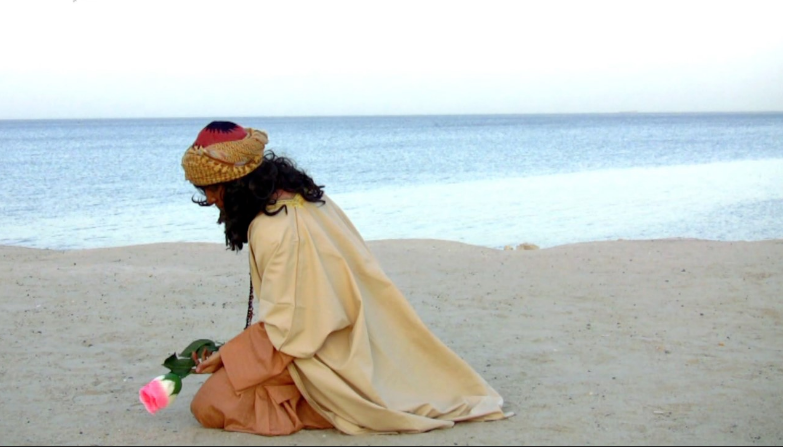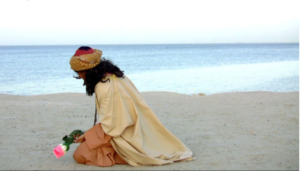Safar: Maverick from Kuwait: Close Encounter with Monira Al Qadiri is on view at the ICA on 17 September at 2 pm as part of Safar Film Festival. A selection of Monira’s shorts will be screened and a conversation with the artist and a curator of the festival Rasha Salti will follow. You can read more info and buy your tickets HERE.
By Aliya Say
“Born in Senegal, raised in Kuwait, educated in Japan” – most of writing on Monira Al Qadiri’s work commonly starts by describing a multicultural, intercontinental background of this young and energetic artist and film-maker. No mere geo-tagging, the validity of this mapping exercise becomes immediately apparent as one starts watching Monira’s video work, with its cross-cultural references and fleeting quotes from here and there (or Here and Elsewhere – borrowing from the title of a major exhibition of the art from the Arab world at the New Museum, in which Monira took place in 2014, as part of the GCC collective).
A cultural hybrid, Monira is an artist with eyes wide open and a willingness to experiment and have fun – from the age of seven she would dress like a mustached dude, because men in Kuwait appeared to lead more exciting lives amidst the Gulf War of 1990-91 than their homebound mothers and wives. Today she dresses up for her videos, which feature drag, trashy makeup and outfits, and lip-syncing. Wa Waila (2008) – one of the works screened at the ICA as part of the Safar Film Festival, takes a form of a music video for an old Kuwaiti folk song. The men and women in the film are cast in opposite gendered roles, with the artist playing the part of the principal male singer. “If I label myself as a “cross-dresser” in my country I go to prison, whereas if I explore unnamable forms of drag in my art people find it somehow strange and comedic and it doesn’t get me in trouble”, she once said in an earlier interview. The repeating music and verses have a trance-like quality, mixing kitsch and humour with explorations of mourning, tragedy and self-pity.
The blue feelings were a topic of Monira’s PhD at the Tokyo University of the Arts, where her research was focused on the aesthetics of sadness in the Middle East stemming from poetry, music, art and religious practices. The Western world today is obsessed with happiness and escapism, as the entire economies are built around a pursuit of the blissful oblivion: Christmas presents, the obligatory cinematic happy ends, antidepressant pills, “happify” apps are all meant to bring a state of everlasting joy here and now, rather than in some remote and inconceivable afterlife. In the Middle East and Asia, there is a long-standing history and tradition that takes a rather different approach, as sadness is seen as a natural state that can be enlightening and noble. BothWa Waila and Abu Athiyya (2013), another video in the festival programme, zoom in on sadness and lament as a cultural form that has been popular in the region for centuries, but is rapidly dying away now – just as a Christian tradition of lamentation has died out in the West.
Visually, the highly stylized videos invoke the traditional cultures of the Gulf, as well as paying homage to Monira’s long time spent in Japan, where cross-dressing, dance and music, elaborated outfits and makeup are all parts of traditional theatre forms, such as kabuki and kyogen.
Other videos on view are more overtly political, displaying the artist’s preoccupations with the current social issues and major events, from state corruption, credit economy abuses and the collapse of the informal Kuwaiti stock market known as the Souk al-Manakh in 1982, to the burning of the oil fields in 1991, and invisibility of labour in the Gulf today.
In Soap (2014), Monira comments on the precarious state of migrant workers in the Gulf, highlighting the total absence of servants in mainstream TV series and soap operas. By imposing the imagery of South Asian maids upon the daily life scenes in the lavishly decorated houses and marble-floor villas, she pushes the labour back into the everyday fabric from which it has been so bluntly and thoroughly erased. It’s a simple yet powerful exercise, allowing the artist to produce an amplified simulation of reality and expose its contradictions – while achieving this with a lightness and humour that are inherent to much of Monira’s work.
About Aliya Say:
Aliya Say is an art writer and critic, currently busy developing Frieze Academy. Aliya is passionate about Contemporary Art from the MENA region, and particularly interested in the intersections between politics and aesthetics, global food systems and sustainability. She tweets occasionally at @SayAliya
Part of SAFAR FILM FESTIVAL 2016


